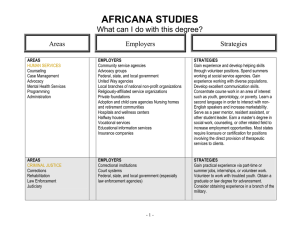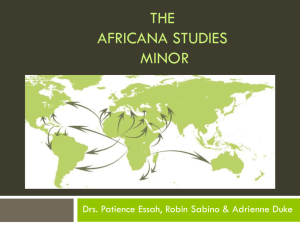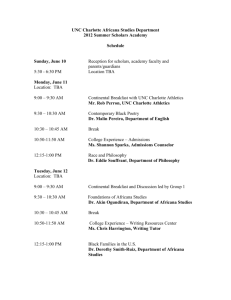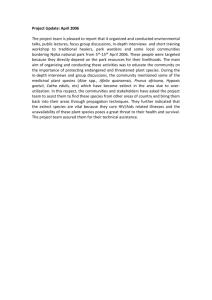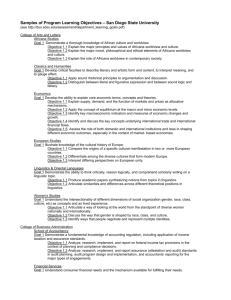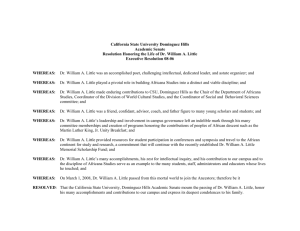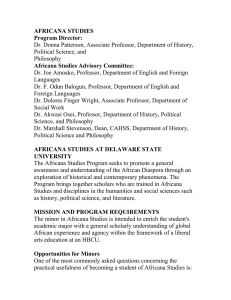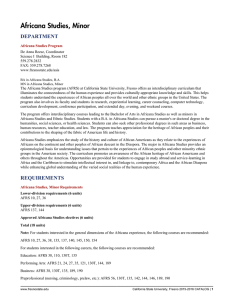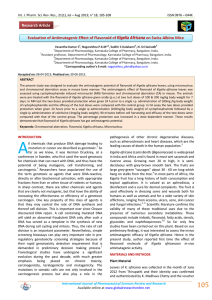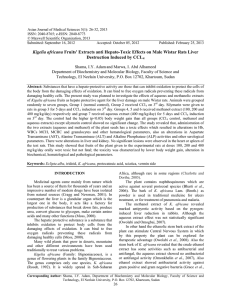AFRICANA STUDIES What can I do with this major? STRATEGIES EMPLOYERS
advertisement
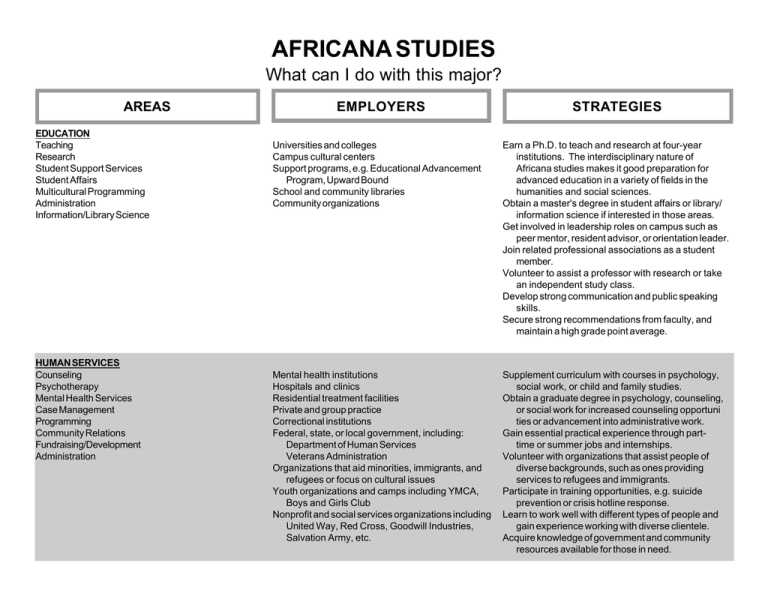
AFRICANA STUDIES What can I do with this major? AREAS EDUCATION Teaching Research Student Support Services Student Affairs Multicultural Programming Administration Information/Library Science HUMAN SERVICES Counseling Psychotherapy Mental Health Services Case Management Programming Community Relations Fundraising/Development Administration EMPLOYERS STRATEGIES Universities and colleges Campus cultural centers Support programs, e.g. Educational Advancement Program, Upward Bound School and community libraries Community organizations Earn a Ph.D. to teach and research at four-year institutions. The interdisciplinary nature of Africana studies makes it good preparation for advanced education in a variety of fields in the humanities and social sciences. Obtain a master's degree in student affairs or library/ information science if interested in those areas. Get involved in leadership roles on campus such as peer mentor, resident advisor, or orientation leader. Join related professional associations as a student member. Volunteer to assist a professor with research or take an independent study class. Develop strong communication and public speaking skills. Secure strong recommendations from faculty, and maintain a high grade point average. Mental health institutions Hospitals and clinics Residential treatment facilities Private and group practice Correctional institutions Federal, state, or local government, including: Department of Human Services Veterans Administration Organizations that aid minorities, immigrants, and refugees or focus on cultural issues Youth organizations and camps including YMCA, Boys and Girls Club Nonprofit and social services organizations including United Way, Red Cross, Goodwill Industries, Salvation Army, etc. Supplement curriculum with courses in psychology, social work, or child and family studies. Obtain a graduate degree in psychology, counseling, or social work for increased counseling opportuni ties or advancement into administrative work. Gain essential practical experience through parttime or summer jobs and internships. Volunteer with organizations that assist people of diverse backgrounds, such as ones providing services to refugees and immigrants. Participate in training opportunities, e.g. suicide prevention or crisis hotline response. Learn to work well with different types of people and gain experience working with diverse clientele. Acquire knowledge of government and community resources available for those in need. (Africana Studies, Page 2) AREAS ADVOCACY Domestic and International Advocacy Humanitarian Services Development: Economic Community Housing Disaster/Disease Relief HIV/AIDS Advocacy Policy Development Program Administration Education Volunteer Coordination Grant Writing Fundraising/Development BUSINESS AND INDUSTRY Training and Development Human Resources Equity and Diversity Functions Management Sales Marketing Advertising Public Relations Consulting EMPLOYERS STRATEGIES Black organizations, e.g. National Association of the Advancement for Colored People (NAACP), National Action Network, 100 Black Men Community action agencies Nonprofit organizations, e.g National Black Business Council Private voluntary organizations Faith based organizations (FBO's) and churches International aid and relief organizations NGO's (Non-governmental Organizations), e.g. Action Aid, Oxfam, International Red Cross Federal government agencies with an international focus, e.g. Peace Corps, USAID, and the Foreign Service (State Department) or focus on community assistance, e.g. Housing and Urban Development and the Department of Health and Human Services State and local government agencies Volunteer at relevant local social service agencies to gain experience and demonstrate interest. Participate in campus "alternative break" trips or church-led mission trips to places such as the Caribbean, South America, or Africa. Develop excellent research, writing, communication, and organizational skills. Learn how to motivate individuals and groups. Earn leadership roles in campus organizations, e.g. the NAACP. Learn a language spoken in Africa, e.g. Swahili or Zulu. Plan to study abroad or volunteer in Africa. Seek cultural experiences on campus and get involved with the international student population. Plan to move to larger communities for more opportunities. Public and private corporations in various industries including: Banks and financial institutions Insurance companies Retail stores Hotels and restaurants Consumer goods manufacturers Businesses targeting a Black clientele Staffing agencies Consulting firms Marketing companies Public relations agencies Double major or minor in business. Gain business experience through internships or parttime and summer jobs. Become current with business and industry literature and news. Join campus organizations or professional societies and seek leadership roles. Understand the top skills employers desire and be prepared to demonstrate them, such as communication (oral and written), computer, interpersonal, leadership, and teamwork. Conduct informational interviews with professionals to learn more about career fields. When job searching, seek employers interested in hiring "any major." Learn how to sell your Africana Studies major to companies that value cultural diversity. Be willing to start in a management-trainee program or other entry-level positions. Earn an MBA or a graduate degree in another area of interest for more advanced opportunities. (Africana Studies, Page 3) AREAS COMMUNICATION/WRITING Journalism Creative Writing Freelance Writing Copy Writing Editing Research and Analysis LAW AND POLITICS Law: Corporate Practice Public Interest Law Civil Law Lobbying Government Relations Elected or Appointed Leadership Public Policy Research Intelligence Campaign Management Special Interest Advocacy Program Administration EMPLOYERS STRATEGIES Newspapers Magazines Broadcast media companies including television and movie industry Trade, professional, or consumer publications Publications and Internet sites marketed toward African Americans, e.g. Ebony, Essence Advertising agencies Publishing houses Large corporations Self-employment Pair an interest in Africana Studies with communication skills to write about Blacks, write on topics of interest to minorities, or for publications targeting a Black audience. Obtain a minor in English or journalism or take other writing-focused classes. Write for campus publications such as college newspapers, magazines, or department/program newsletters. Volunteer to assist or tutor students in a writing center. Intern with a publishing house, magazine, or other relevant organization. Create a portfolio of writing samples, especially those that have been published. Seek opportunities for recognition and networking through writing contests and freelance writing submissions. Become familiar with the proposal and submission process involved in freelance writing. Law firms Corporate legal departments Public defenders offices District attorneys Public interest groups, e.g. Southern Poverty Law Center Legal aid Sole practitioner Government agencies, e.g. US African Development Agency Lobbying groups Obtain the J.D. for law positions or an advanced degree in political science, public administration, or public policy for government positions. Supplement curriculum with relevant courses to prepare for law school. Maintain a high grade point average and secure strong faculty recommendations. Prepare for and take the Law School Admission Test (LSAT). Participate in activities that develop strong debate and public speaking skills such as mock trial. Get involved with the pre-law society on campus. Gain relevant experience through jobs or internships with law firms, government agencies, or mediation centers. (Africana Studies, Page 4) GENERAL INFORMATION • Africana Studies provides an interdisciplanary background that helps students develop analytical, critical thinking, and writing skills while gaining knowledge about the lives and conditions of people from African descent in Africa, the United States, Latin America, and other communities. • When paired with a major in another field, Africana Studies can enhance the employability of a student because of a deeper understanding of the African-American experience, culture, and history which many organizations will value. Training in this field can lead to a better appreciation of certain customers or clients. • Some students may choose to study Africana Studies because they enjoy the subject but wish to pursue careers requiring "any major." In this scenario, it is critical to develop skills relevant to targeted field through internships, part-time or summer jobs, or volunteer experiences. • Africana Studies majors are excellent candidates for a number of graduate school options because of their broad liberal arts background as well as specific interests that may set them apart from other students. For those wishing to pursue graduate education, maintain a high GPA, establish relationships with faculty to secure strong recommendations, and gain experience through volunteer, work, or research opportunities. © 2009 The University of Tennessee Prepared by the Career Planning staff of Career Services at The University of Tennessee, Knoxville. (2009) UTK is an EEO/AA/Title VI/Title IX/Section 504/ADA /ADEA Employer
